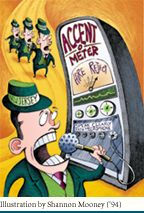 |
 |
||||||
|
|
|
|
|
“The student would call Texas clients, and he said, ‘Texans relate to and buy more from other Texans.’ His reason seemed legitimate, but something didn’t seem right about screening candidates for a job based on their accents,” she says. Markley, then a master’s student in linguistics, decided to find out if a regional accent would have an effect in the hiring process. For her thesis, the August graduate conducted the first- known study of job hirers’ judgments on U.S. regional accents. The research, conducted with Patricia Cukor-Avila, UNT assistant professor of English, was funded by grants from the Trice Foundation Dallas and IBM. The study showed that prospective employees with identifiable regional accents may face discrimination when interviewing for jobs, since interviewers rate those with less identifiable accents higher. “We tell job candidates, ‘Show me how you stand out,’” Markley says. “But according to our research, if you sound different from other candidates, you’re eliminated.”
Judging by voices With help from Jack Becker, associate professor of business computer information systems, Cukor-Avila and Markley created a CD-ROM program of 10 males reading the same 45- second passage. Each speaker was from a different part of the United States — Texas, Georgia, Louisiana, Alabama, North Carolina, Minnesota, California, Boston, Chicago and New Jersey. Each had an accent common to a large population within that region. To guard against discrimination on the basis of sex or race rather than regional accent, the researchers used only white male speakers. Fifty-six professionals involved in hiring new employees listened to each speaker and made judgments about him based solely on how he sounded. The CD-ROM program asked the job hirers to rate each speaker as positive or negative on a seven-point scale. The hirers also judged if each speaker sounded educated or uneducated, intelligent or unintelligent, energetic or lazy, uptight or laid back, outgoing or withdrawn, assertive or docile. Using a U.S. map, the hirers guessed each speaker’s region. They also decided if each would be competent on the job and would fit into the companies’ cultures. The hirers were presented with four job categories — positions requiring a high level of public or customer contact; positions with a high level of technical expertise but little public or customer contact; positions involving extensive internal communications; and positions requiring little technical expertise and little or no customer contact. They listed the job category that would suit each speaker. The speaker from California had the most positive rating of 5.14, followed by the speaker from Minnesota (5.07). Less than 30 percent of the respondents correctly identified these regional accents. The speaker from Texas, though more identifiable, was also rated positively. Cukor-Avila says most of the hirers were Texans and so may prefer Texas accents. The New Jersey speaker, with a mean rating of 3.65, was judged the most negatively. This accent was also the one most recognized by the job hirers, with 59 percent correctly identifying it.
Less accent, more education? Cukor-Avila says she wondered if the job hirers were reacting negatively to the “perception of where the speaker was from” or just to the accent. In selecting job positions for the speakers, more than 50 percent of the hirers selected positions requiring a high level of customer contact for two of the highest-rated speakers — those from California and Texas. Only 5 percent selected the New Jersey speaker for these positions. Instead, more than 64 percent selected the New Jersey speaker for positions requiring little technical expertise and little-to-no customer contact. Markley says the respondents were surprised and dismayed when they learned that all of the speakers had at least a bachelor’s degree and seven had doctoral degrees — including the New Jersey speaker. “Many were embarrassed about their answers,” she says. Rather than proving that people need to rid themselves of strong accents, Markley says the research proves that companies need to develop tools like the CD-ROM program to help job hirers determine their biases. “Nothing
legal will stop accent discrimination. But in many cases, merely
having that information and knowing that the employer does not support
it would likely have a great effect in hiring decisions,” she says.
|
||||||||

 AS
UNT DIRECTOR OF COOPERATIVE EDUCATION, Dianne Markley (’00 M.A.)
matches students to jobs that will combine classwork with challenging
work experience. She was surprised when an employer in New York
phoned and requested a student with a Texas accent for an internship.
AS
UNT DIRECTOR OF COOPERATIVE EDUCATION, Dianne Markley (’00 M.A.)
matches students to jobs that will combine classwork with challenging
work experience. She was surprised when an employer in New York
phoned and requested a student with a Texas accent for an internship.